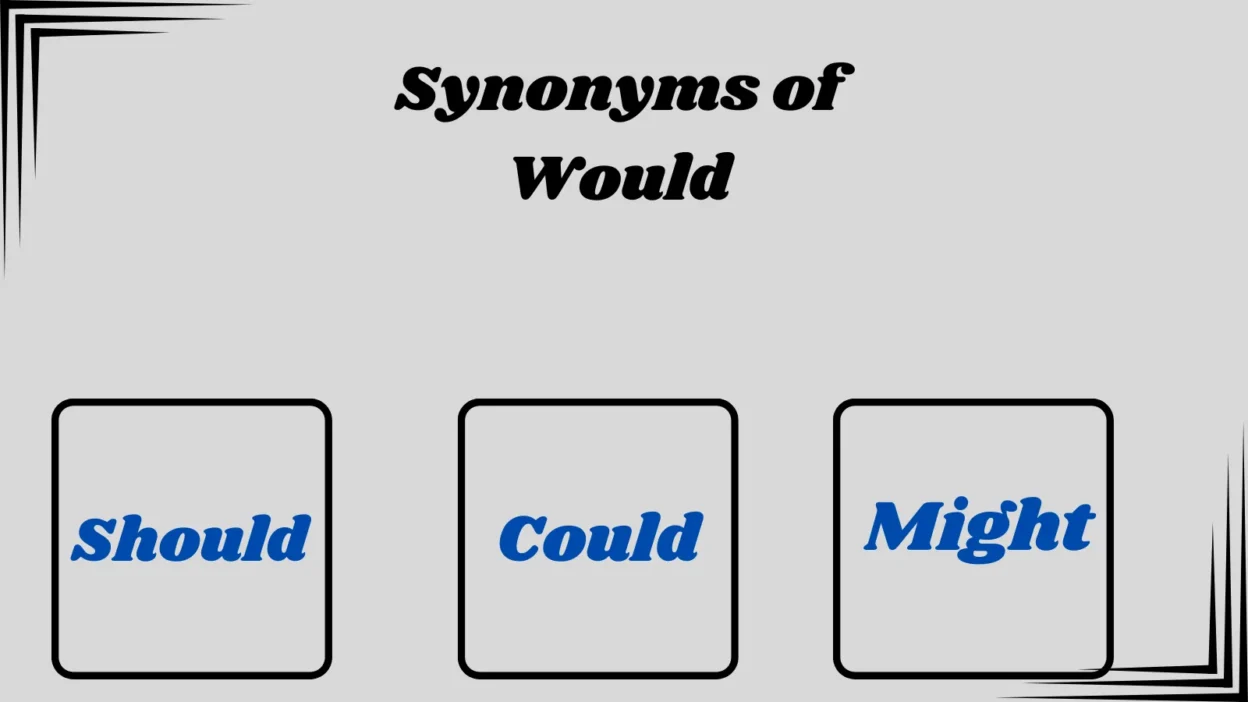Tired of repeating the word “would” in your writing or speech? Whether you’re crafting a story, writing an email, or just trying to sound more natural in English, using the same word over and over can get dull fast. Would is a versatile word—used for polite requests, hypothetical situations, future-in-the-past moments, and more—but it’s not your only option. If you’re looking to freshen up your language, this list of synonyms of would will help you express yourself more clearly and confidently.
In this article, we’ll explore different ways to replace “would” depending on the situation—formal, casual, written, or spoken. You’ll get clear meanings, example sentences, and tips on when to use each alternative.
If you’re an English learner, a writer aiming for variety, or someone polishing professional communication, these synonyms of would will boost your fluency and make your words stand out.
What Does “Would” Really Mean?
Before we jump to the synonyms, let’s unpack the core of would:
- Politeness and modesty: “Would” often sounds less direct and softer, making requests or offers feel gentle and respectful.
- Hypothetical or conditional: It talks about things that might happen under certain conditions (“If I had time, I would travel”).
- Future in the past: Describes something that was expected or planned in the past (“He said he would call”).
- Habitual past action: Refers to something done regularly in the past (“When I was young, I would visit my grandmother every summer”).
Because of these nuances, each synonym we explore will carry some shade of these meanings but with its own flavor or emphasis.
Synonyms of Would: What They Mean and When to Use Them
1. Might
Meaning: Suggests possibility or a polite suggestion, often less certain than would.
Use: When you want to express something possible but not guaranteed.
Example: I might join you for dinner if I finish early.
2. Could
Meaning: Indicates possibility or polite permission.
Use: When talking about potential ability or polite requests.
Example: Could you please pass the salt?
3. Shall
Meaning: Formal or old-fashioned future intention, sometimes used for suggestions.
Use: In formal writing or when offering suggestions (especially British English).
Example: Shall we begin the meeting?
4. Should
Meaning: Expresses advice, expectation, or mild obligation.
Use: When recommending or expressing what’s proper.
Example: You should see a doctor if you’re feeling unwell.
5. Will
Meaning: Expresses definite future action or strong intention.
Use: When you want to sound sure and decisive.
Example: I will help you with your homework.
6. May
Meaning: Polite permission or possibility.
Use: When seeking or granting permission, politely.
Example: May I borrow your pen?
7. Would rather
Meaning: Expresses preference.
Use: When choosing between two options.
Example: I would rather stay home tonight.
8. Want to
Meaning: Direct desire or intention.
Use: When you want to express a straightforward intention, less tentative than would.
Example: I want to travel next year.
9. Wish to
Meaning: Formal way of expressing desire.
Use: In formal letters or polite requests.
Example: I wish to make a complaint.
10. Fancy
Meaning: Informal British English for wanting something.
Use: Casual conversations or invitations.
Example: Do you fancy a cup of coffee?
11. Intend to
Meaning: Plans or aims to do something.
Use: When clearly stating purpose or goal.
Example: I intend to finish the project by Friday.
12. Feel like
Meaning: Informal way to express desire or mood.
Use: Casual conversations about preferences.
Example: I feel like going for a walk.
13. Prefer to
Meaning: Expresses preference politely.
Use: When gently stating a choice.
Example: I prefer to work in the morning.
14. Suppose to
Meaning: Indicates expectation or assumption.
Use: When expressing what is expected or assumed.
Example: You’re supposed to finish by 5 PM.
15. Happen to
Meaning: Used to express chance or polite inquiry.
Use: When making a polite or casual offer/question.
Example: Do you happen to have a spare ticket?
16. Be willing to
Meaning: Shows readiness or consent.
Use: When emphasizing voluntary action.
Example: I am willing to help you anytime.
17. Be inclined to
Meaning: Shows a gentle tendency or preference.
Use: When slightly favoring a choice.
Example: I’m inclined to agree with you.
18. Be likely to
Meaning: Indicates probability or expectation.
Use: When guessing the chance of something happening.
Example: It’s likely to rain this afternoon.
19. Be apt to
Meaning: Shows tendency or natural inclination.
Use: When describing habitual or natural behavior.
Example: Children are apt to imitate adults.
20. Choose to
Meaning: Indicates a deliberate decision.
Use: When highlighting a conscious choice.
Example: She chose to stay silent.
21. Would prefer
Meaning: A polite way to express preference.
Use: When softening preference in polite contexts.
Example: I would prefer to meet next week.
22. Be ready to
Meaning: Preparedness to act.
Use: When emphasizing readiness.
Example: I’m ready to leave whenever you are.
23. Be apt to
Meaning: Likely or prone to do something.
Use: When talking about tendencies or habits.
Example: He is apt to forget names.
24. Dare to
Meaning: Expresses courage or challenge.
Use: When discussing boldness.
Example: Would you dare to try skydiving?
25. Be disposed to
Meaning: Inclined or willing to do something.
Use: More formal or literary contexts.
Example: She was disposed to forgive him.
26. Be expected to
Meaning: Something anticipated or required.
Use: Formal or official expectations.
Example: You are expected to submit the report by Monday.
27. Be about to
Meaning: Something happening imminently.
Use: When emphasizing immediacy.
Example: I was about to call you.
28. Feel disposed to
Meaning: Slight willingness or mood.
Use: Polite or literary tone.
Example: I feel disposed to help.
29. Care to
Meaning: Polite offer or invitation.
Use: When inviting politely.
Example: Would you care to join us?
30. Be apt to
Meaning: Likely or prone to do something.
Use: When talking about tendencies or natural habits.
Example: She is apt to forget her keys.
How to Choose the Right Synonym of Would?
Here are some quick tips to help you pick:
- Politeness: Use might, could, would prefer, care to, or wish to for softer, polite tones.
- Certainty: Choose will, shall, or intend to when you want to sound definite.
- Informal vs. Formal: Words like fancy and feel like are casual; be disposed to and wish to are more formal or literary.
- Hypothetical/Conditional: Stick with might, could, would, suppose to, or would rather.
- Preference: Use would rather, prefer to, would prefer, or choose to.
- Readiness or willingness: Be willing to, be ready to, care to fit best.
- Tendency: Be apt to, be inclined to, and be likely to indicate likelihood or habit.
Cultural and Emotional Contexts
- British English tends to favor shall and fancy more than American English.
- Would and could are often preferred in polite requests globally because they soften demands.
- More formal or literary contexts might prefer be disposed to or wish to over casual phrases.
- In emotional contexts, words like care to or feel like can signal warmth and friendliness.
Conclusion
The word would may seem small, but it carries a lot of weight, expressing possibility, politeness, habits, and imagination. However, using the same word too often can dull your writing or speech. That’s why exploring the synonyms of would can make such a difference.
From formal alternatives like might and could, to conversational swaps like was going to or used to, each synonym adds variety and nuance. Whether you’re improving everyday conversations or polishing a piece of writing, having more options makes you a more flexible and effective communicator.
Next time you reach for would, try one of its many alternatives—you might be surprised how much it improves your flow



